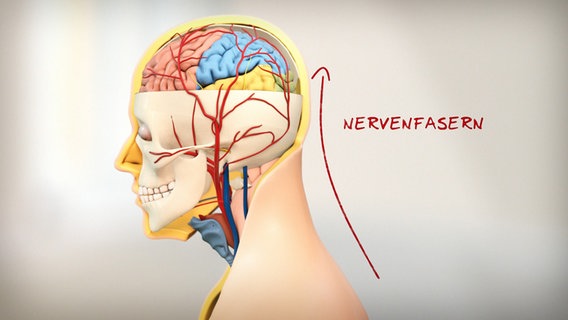Status: 07.03.2023 09:07
Drugs from the NSAID group such as ibuprofen and diclofenac are popular as pain relievers. Regular intake can have dangerous side effects, especially for older people.
Medications from the group of active substances called non-steroidal anti-inflammatory drugs (NSAIDs) such as diclofenac, ibuprofen, naproxen and ASA are available over-the-counter in low and medium doses and are primarily used for pain and inflammation of the musculoskeletal system, as they relieve both the pain and the musculoskeletal system Inflammation and also have an antipyretic effect. Many are aware that these medicines cause stomach problems in the long term. But there can be other dangerous side effects, according to one Study even to heart attack and stroke and also to kidney failure.
Painkillers affect enzymes
The benefit and the risk of the drugs lie in the inhibition of the enzyme cyclooxygenase (COX). There are two subtypes of this enzyme – cyclooxygenase-1 and -2. They have a central function in the regulation of inflammatory processes and are also responsible for the development of pain. They also influence blood clotting and are responsible for protecting the gastric mucosa and the kidneys. If the enzyme is inhibited, several processes are affected at the same time.
Not every active ingredient increases the risk of cardiovascular disease equally. The side effects depend on which subgroup of cyclooxygenase is inhibited. While strong COX-1 inhibition can lead to increased problems in the gastrointestinal tract and an increased risk of bleeding, inhibition of COX-2 increases the risk of cardiovascular problems. The active ingredients ibuprofen and diclofenac inhibit both COX-1 and COX-2. Therefore, long-term and high-dose use of the medication can also increase the risk of stomach bleeding and kidney damage.
Which active ingredients are NSAIDs?
There is a whole range of different NSAIDs, which can be grouped into eight groups of active substances. Available in Germany are:
1. Salicylic Acid Derivatives
- acetylsalicylic acid (ASA)
- Methyl Salicylate and Hydroxyethyl Salicylate (for external use only)
2. Arylacetic Acid Derivatives
- Diclofenac
- Aceclofenac
- Felbinac (for external use only)
3. Indoleacetic acid derivatives
4. Arylpropionic Acid Derivatives
- Ibuprofen
- Dexibuprofen
- Naproxen
- Ketoprofen
- Flurbiprofen
- dexketoprofen
5. Anthranilic Acid Derivatives (for external use only)
6. Oxycam
7. Pyrazolidindione
- Propyphenazon
- Phenylbutazone
8. COX-2-Hemmer
Interactions with other drugs
It is particularly risky when older people in particular take different active substances that all potentially damage the same organ. For example, many sufferers take an ACE inhibitor to control their high blood pressure and a diuretic to control water retention. If you then add a painkiller from the group of NSAIDs, it can be the last straw and cause serious damage to the kidneys. In addition to kidney failure, bleeding in the gastrointestinal tract is the second common side effect of NSAIDs. This is particularly dangerous if those affected are also taking anticoagulant medication, for example to prevent a stroke. Together, the drugs can lead to life-threatening bleeding that is often not noticed until late.
PRISCUS list warns of risks for older people
In order to avoid dangerous overdoses in old age, the so-called EARLY-List created. It lists a total of 177 active substances that can be risky for older people. Including all painkillers in the NSAID group.
Warning from the European approval authority EMA
The European regulatory authority EMA now warns against the use of the active substance diclofenac in patients with heart failure, coronary heart disease, arterial occlusive disease or vascular diseases in the brain and also advises smokers and people with high blood pressure, diabetes or high cholesterol to be more careful. The background is, among other things, findings that NSAIDs can worsen existing cardiac insufficiency and impair the effect of antihypertensive drugs.
Diclofenac and naproxen: large differences in effect
There are definitely differences between the individual NSAIDs that doctors should take into account when prescribing:
- That’s the active ingredient Naproxen particularly dangerous for the stomach, but this can be almost eliminated by combining it with substances that protect the stomach (proton pump inhibitors). However, like the chemically related ibuprofen, naproxen can also cause serious damage to the kidneys – and this is true even in younger people, like one, at higher doses US-Studie demonstrated to more than 760,000 military personnel. The dose should therefore be kept as low as possible and anyone suffering from kidney disease should avoid these drugs altogether.
- At Diclofenac On the other hand, the risk of a heart attack and other vascular complications is significantly higher than with ibuprofen or naproxen. According to a Danish Study With around six million data records, diclofenac carries a particularly high risk of cardiovascular problems. According to the study, in the worst case it can lead to a fatal heart attack. In addition, there are interactions with other drugs such as ASA, whose platelet-inhibiting effect to protect against cardiovascular diseases can be restricted or even canceled by NSAIDs.
- Anyone who is dependent on both drugs should therefore take ASA as far apart as possible before the other NSAID. Long-term use of NSAIDs can also cause headaches that should not be treated with NSAIDs because they then get worse.
Diclofenac as an ointment and tablet
Many pain physicians and rheumatologists only use diclofenac for serious illnesses when no alternative drugs are available. Diclofenac can also cause problems when used as an ointment: when used regularly and over a large area, there are similar risks to those of diclofenac tablets. However, anyone who only occasionally applies diclofenac ointment to the affected joint in the event of acute pain does not have to expect side effects.
Keep application duration and dosage as short as possible
Experts recommend keeping the duration of use and dosage of NSAID preparations as short as possible and resorting to other drugs if there is an increased risk. The problem: The pain-relieving effect of paracetamol is lower, but at the same time there is a risk of liver damage. Prescription metamizole/novaminsulfone can be a good alternative for severe pain and fever, but unlike NSAIDs, metamizole doesn’t have an anti-inflammatory effect and, in rare cases, it can cause a dangerous side effect, a reduction in white blood cell count.
If possible, pain should be combated primarily with non-drug methods such as physiotherapy, heat, cold, massage or exercise training. Under no circumstances should patients take NSAIDs for weeks without investigating the cause of their pain and consulting a doctor.
experts on the subject
Further information




